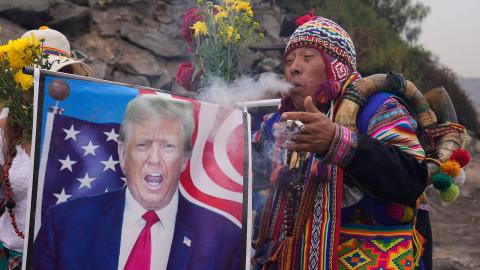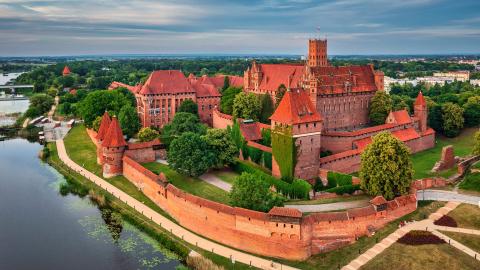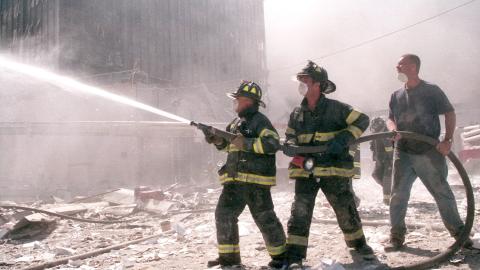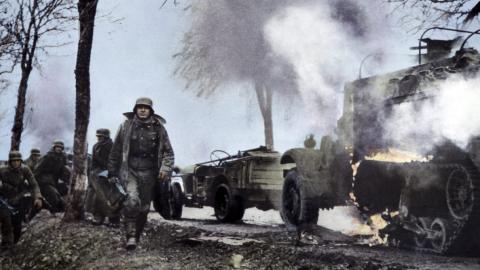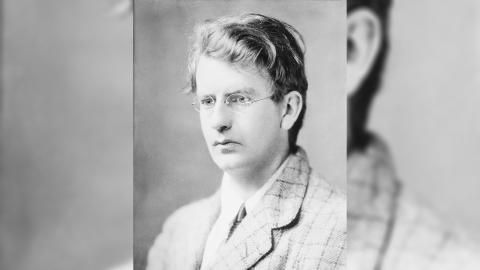The Royal Ulster Riflemen and the battle of Shanghai
Many western governments who had interests in Shanghai then sent troops to defend the settlement which slowly filled with US Marines, Italian Savoy Grenadiers and French colonial troops.
The world was a tumultuous place in 1937. In April, German pilots operating under the command of Spanish Nationalist forces would destroy Guernica in Northern Spain as the country’s Civil War raged. In the Soviet Union, Stalin’s purges would lead to the deaths of an estimated 700,000 people by the year’s close. Italy continued to flex its muscle in the Mediterranean whilst Adolf Hitler was becoming more vocal with his demands for Lebensraum or great living space for the German people.
Shanghai in 1937 was home to 3.5 million people, it was Asia’s second largest city after Tokyo .
In this climate of uncertainty and antagonism, Japan launched a full-scale invasion of mainland China. The culmination of decades of Japanese imperial expansion came to a head on the night of July 7th 1937 with what became known as the Marco Polo Bridge Incident. Shots fired between Japanese and Chinese troops led to a full-scale engagement and the capture of Beijing by Japanese forces. Buoyed by their success, the Japanese soon turned their attention onto a city that was known as the Jewel of the East, Shanghai.
Shanghai in 1937 was home to 3.5 million people, it was Asia’s second-largest city after Tokyo and the fifth largest in the world. It was located in China’s industrial heartland, the gateway to the whole of the continent. The European powers knew of Shanghai’s strategic power and had created their own ‘city within a city’ known as the International Settlement. Established following the end of the first Opium Wars with China in the 1860s, the International Settlement was administered by a number of powers, including Great Britain. Its Western occupants marvelled at its Art Deco architecture and attempted to seal themselves off from the remaining Chinese population.
The mysterious death of two Marines on 9th August 1937 was all the pretext the Japanese needed to launch an assault on the city. As the fighting between Chinese and Japanese troops increased, the great powers grew concerned about the safety of their subjects and property. This came to a head-on 14th August, or Black Saturday as it became known, when inexperienced Chinese pilots, aiming for a Japanese cruiser moored in the Huangpu River, instead dropped their bombs on the International Settlement killing and injuring over 3,000 civilians.
Many western governments who had interests in Shanghai then sent troops to defend the settlement which slowly filled with US Marines, Italian Savoy Grenadiers and French colonial troops. The tensions tearing Europe apart were forgotten, with this Asian crisis bringing the powers together. Britain, the long-time leader among the Settlement nations, quickly dispatched two regiments from Hong Kong: The Royal Welch Fusiliers and The Royal Ulster Rifles.
The strange disconnect between the Western powers and the fighting ranging in Shanghai was perfectly summed up when the Ulsters arrived in the city. As the destroyer carrying the battalion edged up the river, both the Japanese warships and Chinese gun batteries ceased their fierce exchange of fire and saluted until the British ships had passed! As the Ulsters arrived on the famous Bund Waterfront they were immediately posted to secure sector D in the far west of the settlement. Their job was to secure the settlement’s perimeter barb wire fences and erect sandbagged section posts.
The Ulsters’ defensive positions were in close proximity to the intense fighting between Japanese and Chinese forces leaving them extremely vulnerable.
The Irishmen spoke of the Japanese 'in profane terms of baffled hate!'
This was demonstrated on the morning of 24th October 1937. A Japanese plane launched an unexpected and deliberate attack on a party of civilians travelling along the Keswick Road just inside the boundary of the International Settlement. In witnessing this terrible attack, Royal Ulster Rifleman Patrick McGowan left the safety of his outpost and attempted to clear the road. Through this act of courage he was hit by the strafing aircraft and killed. McGowan’s death caused an international incident and eventually forced an apology and compensation from the Japanese Government. .
McGowan’s death brought an abrupt end to any goodwill towards Japanese troops and the Ulsters decided to take action. On October 29th eight Royal Ulster Riflemen risked their lives by running a gauntlet of Japanese fire to rescue fifteen Chinese civilians who had become trapped on the damaged Jessfield railway bridge on the outskirts of the settlement. The British also began to take messages destined for family or sweethearts across their own lines from trapped Chinese soldiers.
Tragically, just days after their heroic rescue, four more Ulster riflemen were killed by Japanese shellfire. James Mellon, William Christopher Howard and Robert Delaney were killed in their sandbagged outpost as they were taking their supper, whilst James O’Toole died when a shell burst in a cafe as he was drinking a pot of beer. There was further condemnation from the British Government. The feelings of the Ulster Riflemen were clearly summed up in The North China Herald, who reported that the Irishmen spoke of the Japanese 'in profane terms of baffled hate!'
Despite a desperate resistance, by early November Japan had taken control of the city of Shanghai and demonstrated their newfound status by marching its victorious troops through the International Settlement. China’s resistance against insurmountable odds in the city was designed to both illicit international support in its struggle against Japan and to show that Japanese incursions into its territory were not just a series of incidents but an all-out military invasion. China may have gained moral support but despite the deaths of their own servicemen, Britain was unwilling to exert pressure on Japan whilst German and Italian power continued to grow in Europe.
The graves of the Ulster riflemen would remain forgotten in Shanghai until the elderly niece of Patrick McGowan decided to try to find out what happened to her uncle. Her incredible story is told in the award-winning documentary Finding Wee Paddy.

